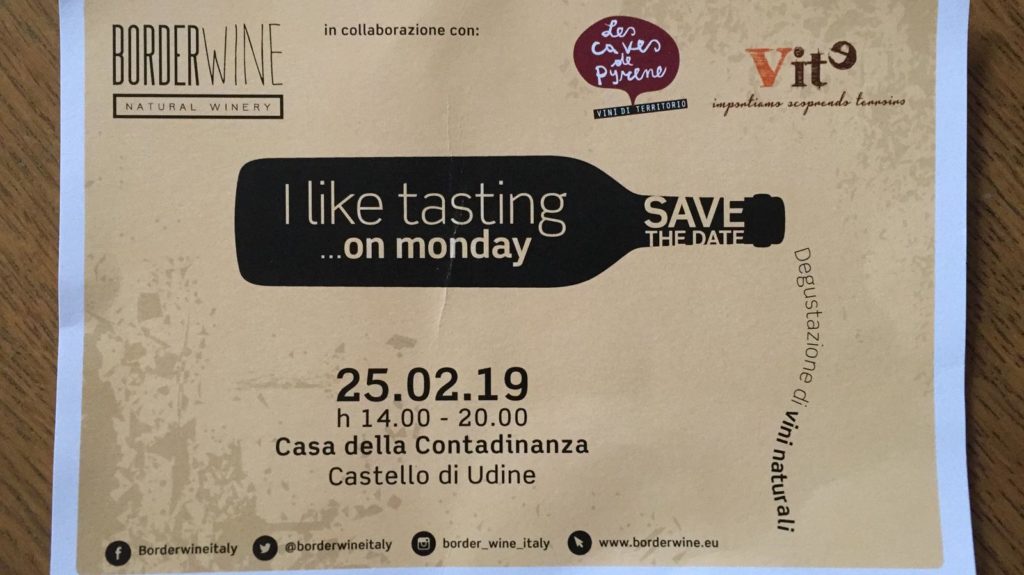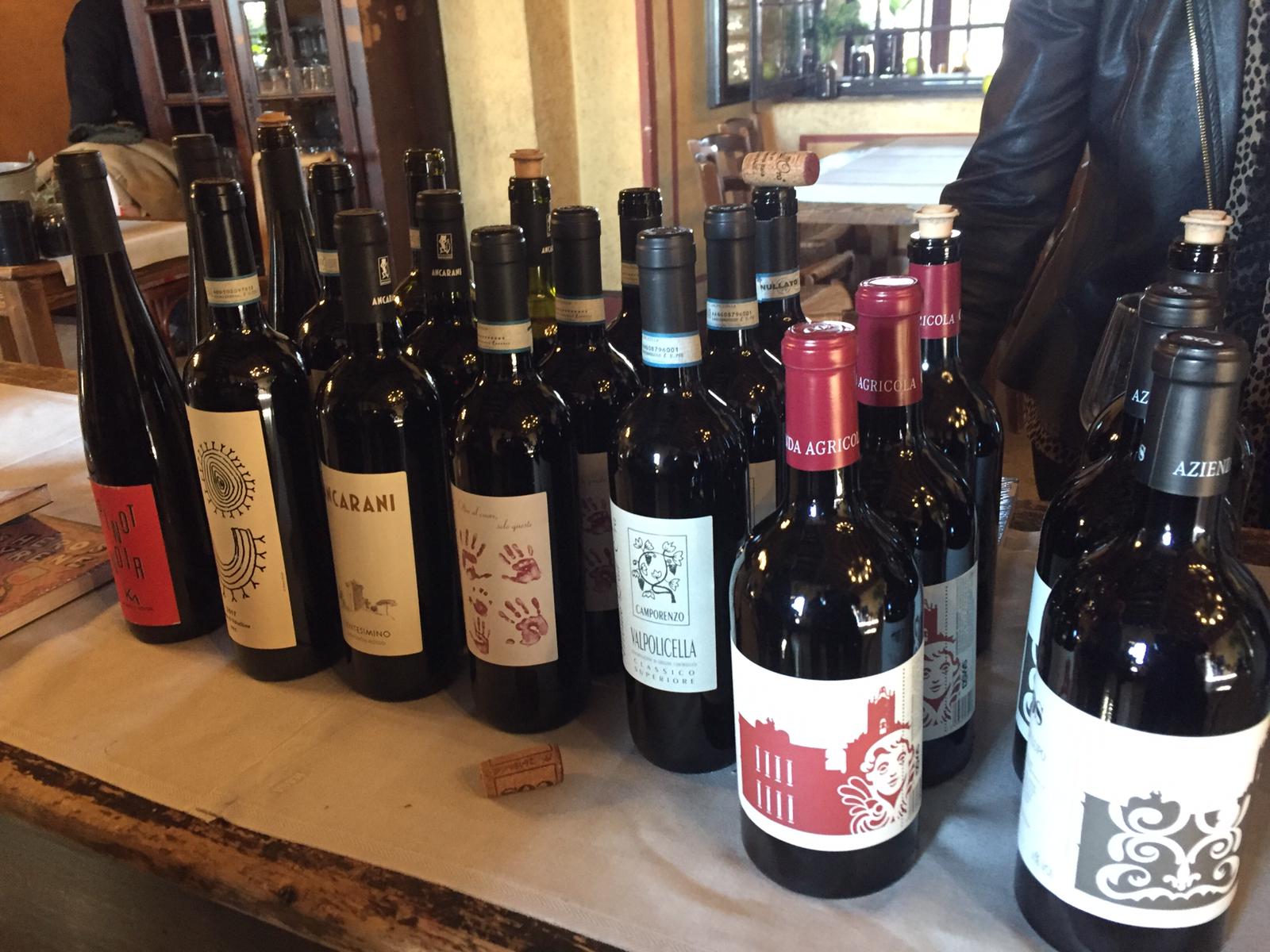Natural wines tasting in Udine
Wine tasting on Monday, what a wonderful idea! A Monday when you can stay away from your desk and go tasting natural wines, cool! When I read of this event on Facebook, I suddenly thought “I have to go!” and so I did, together with my partner in crime Erica and some friends.
I like tasting… on Monday is an event that the guys of Borderwine, the first transboundary natural wine salon in Friuli Venezia Giulia, organized on Monday 25th February at Casa della Contadinanza in Udine, a beautiful location next to Udine’s castle.
The tasting was about natural wines and other local products from different Italian regions. The Borderwine association is indeed born with the aim to promote and give value to small producers (they use to call them wine artisans) that comply with some parameters of naturalness and to speak to a vast public about conscious drinking, ethical choices and respect for the territory.

Natural wines
Before going into the tasting, I would like to say a few words about natural wines.
What is a natural wine? The “technical” definition is wine made with minimal chemical and technological intervention, both in growing grapes and making them into wine. The term is used to distinguish such wine from organic wine and biodynamic wine because of differences in cellar practices. All natural wines are, however, farmed organically at a minimum and many growers are biodynamic in the vineyard as well.
Strictly speaking, natural wines are wines that are produced without adding or removing anything during winemaking, although some growers add tiny quantities of sulphites at bottling, so that strictly speaking their wines are not natural wines, but ‘only’ organic (and possibly biodynamic).
The tastings
I must confess my inexperience about this kind of wines, so I didn’t know what to expect from the tastings. At the end, I found them interesting and promising, sometimes different from the “classical” wines, but always engrossing. Here is a selection of my favorite ones.
Vermentino DOC Colli di Luni Il Torchio 2017
Vermentino is a grape variety you can find in Liguria, Tuscany and Sardinia. Il Torchio winery is in Castelnuovo Magra, La Spezia, only some kilometers from the sea, and you can feel it in the glass: the wine is mineral, fresh, with notes of white fruits, sage, herbaceous hints.
Soave “Castelcerino” Cantina Filippi 2017
Cantina Filippi is immersed in the highest altitude terroir of Soave, in Veneto, in the municipality of Castelcerino. Here, at 400 meters above sea level, Filippo Filippi cultivates his old vineyards of Garganega and Trebbiano di Soave with biological practices. The wine reflects the volcanic origin of the soil: aged on yeasts for 18 months in steel, it has an aromatic richness and great minerality.
Barone Pizzini
Great supporter of organic farming and all those choices aimed at reducing environmental impact and energy consumption, Barone Pizzini is a company that represents one of the most important and dynamic wine-making realities in Franciacorta.
To go into the winery’s philosophy, we tasted 3 different Metodo Classico sparkling wines.
The first one was Animante Franciacorta DOCG: 78% Chardonnay, 18% Pinot Noir, 4% Pinot Blanc, 20-30 months on yeasts. Light straw-colored, with a fine and persistent perlage. The nose expresses citric hints and a beautiful mineral trail. It is fresh and pleasantly sapid.
Naturae Franciacorta DOCG 2014 Edition was the second one: 60% Chardonnay, 40% Pinot Noir, 36 months on yeasts. Here the origin of the ground, made of red and marine soils, is evident: the nose and the taste are salty and mineral, but pinot noir gives also hints of berries jam.
The last one we tasted was Rosé Franciacorta DOCG 2014 Edition: 80% Pinot Noir, 20% Chardonnay, 30-40 months on yeasts. Once again, pinot noir is evident with blueberries and currants hints, acidity and minerality give this Metodo Classico a good structure.
Tenuta L’Armonia
Tenuta L’Armonia produces “real and vital wines without oenological compromises that would upset the sense of sustainable viticulture and agriculture, always in the forefront”, as they told us. Situated in Montecchio Maggiore (Vicenza), vineyards are at 400-600 meters above the sea. Vintage is made when quite all the grape varieties are mature and almost all the wines are macerated and not filtered. Here are some of the wines we tasted.
Spumante Sur Lie “Frizzi Pop”: Pinot Noir and Durello. It is a wine refermented in the bottle, during the second fermentation (the yeasts are added in the bottle) is also added some frozen must of the first fermentation. Very light straw yellow, with a good perlage. On the nose there are mainly fruity scents, above all white peach.
“Bianco Pop” 2016: Pinot Blanc and Incrocio Manzoni. The grapes are left macerating for 3-4 days. The wine presents a good acidity and its bouquet is made of floral hints, a note of vanille and caramel; in the mouth is rich, tasty. This is typical of clayish soils, that give delicate and fresh wines enriched in structure by maceration.
“Perla Cru”, 2016: 100% Garganega. Bunches are left on the plant up to an extreme maturation. This wine is fermented spontaneously and aged in acacia barrel. The over-maturation, together with the aging, lead to hints of caramel, flanked by peach, apricot and a flowery meadow.
Vignale di Cecilia
Vignale di Cecilia is a small wine estate in the Veneto region, in the Euganean Hills, a small angle of the Mediterranean on the mainland. The climate is moderate due to it’s closeness to the sea and the soil is composed of limestone and volcanic, absolutely unique and one of a kind in Europe.
Poldo 2017: Garganega, Tocai Italico and Moscato.
Light straw yellow, with scents of fruits and roses, typical of Moscato, and a mineral aftertaste. It is a very pleasant, easy to drink wine.
Benavides 2017: 50% Moscato and 50% Garganega.
A bright straw yellow wine, with spicy and floral hints, fruity (peach and orange), a long freshness and saltiness.

Villa Job
Long and soft maceration, searching of balance, culture of wine. These are the main values of Villa Job, young winery held by Alessandro and Lavinia in Zugliano, close to Udine.
The wine is born first of all inside the vineyard, where leafs and grass are almost untouched, and is accompanied in the cellar with the help of indigenous yeasts, spontaneous and low sulfur fermentations.
Sudigiri 2017 IGT Venezia Giulia: 100% Sauvignon
Indigenous yeast and spontaneous fermentation, after two days of maceration on skins it aged in concrete vats for 6 months and in old barrique for other 3 months.
In a universe of aromas you can identify herbs, rosemary, elder, menthol and litchi.
Guastafeste 2016 IGT Venezia Giulia: 100% Pinot Gris
Around two months of soft maceration in open barrel. Aged in mulberry oak, old barrique and one year of bottle.
“Ramato”, with a range of scents typical of tertiary: candy, herbs, artemisia, anice… A lovely surprise!
Serious Red 2016 IGT Venezia Giulia: 100% Refosco dal Peduncolo Rosso
Fermentation on the skins in open tonneau; aging in concrete vats, around 12 months in big barrel and old barriques.
An intense ruby red wine that opens to hints of cherry and ripe red fruits as well as spicy scents.
I like tasting… on Monday was a great event, I had the opportunity to know something more about natural wines and I really appreciated them, together with the natural local products we tasted (I loved Figulì and its hand-crafted and organic bakery products and the excellent goats cheeses by Zore Formaggi).
I look forward to repeating the experience in Cividale on May 26th and 27th, when the Borderwine Market Exhibition 2019 will take place. See you there!

